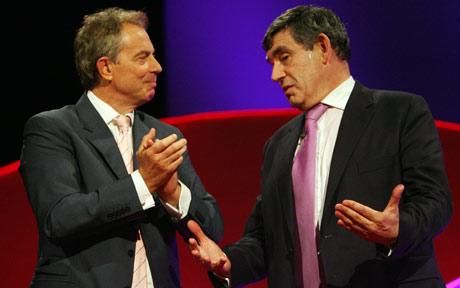Blair:
Diana and Dodi were killed in a Paris car crash in August 1997. Blair’s memorial speech, calling her the “people’s princess,” caught the public mood perfectly and helped cement his popularity at the time."Diana was easier to get along with, an “extraordinarily captivating” woman. Blair says he warned her he had a bad feeling about her boyfriend, Dodi Fayed. “Dodi Fayed was a problem,” he says, though he admits he was at a loss to say exactly why. “I felt uneasy.”"
Elsewhere, Blair speaks of his relationship with alcohol, saying he drank a whisky or a gin and tonic before dinner, and a “couple of glasses of wine or even half a bottle with it.”
“I had a limit,” he says.” But I was aware it had become a prop” — though, on balance, he thinks booze did him more good than harm.
via vosizneias.com
the gloves just came off. let us see if Mr Emotional IQ at zero wants to play
Photo: The Telegraph
The former prime minister’s memoir describes Mr Brown as "maddening" and blames him for allowing the Tories into power by deviating from his predecessor's New Labour strategy.
Mr Blair disclosed that his former chancellor put “relentless personal pressure” on him during his time in Number 10.
He admitted that he repeatedly considered sacking Mr Brown but failed to identify anyone who could replace him and eventually concluded that he was better “inside and constrained” than “outside and let loose”.
He also accuses his Chancellor of effectively trying to blackmail him into backing down over a pensions reform.
Mr Blair said Mr Brown lacked political instinct "at the human gut level", according to The Guardian.
He wrote: "Political calculation, yes. Political feelings, no. Analytical intelligence, absolutely. Emotional intelligence, zero."
He described Mr Brown as a “maddening figure” who was not capable of being a “normal bloke” sort of politician, but conceded that he possessed an acute “analytical intelligence” which stood him in good stead as chancellor.
In his long-awaited memoir, A Journey, Mr Blair wrote: “My failure to [remove him] was not a lack of courage…It was because I believed, despite it all, despite my own feelings at times, that he was the best chancellor for the country.”


